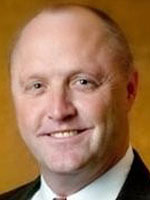Senior Reporter
Secret Funding for Plaintiff Attorneys Is On Rise, Experts Say

[Stay on top of transportation news: Get TTNews in your inbox.]
A controversial practice of financial firms funding litigation for attorneys who sue trucking companies is putting defense attorneys at a disadvantage — and is on the rise.
The practice involves providing loans — predominantly to plaintiff attorneys — and, in some instances, directly paying doctors up front for treatment of individuals injured in accidents, according to insurance experts and defense attorneys who monitor litigation finance.
Most of the loans are provided by financial firms seeking profit, and are mostly made in secret. The greatest concern for opponents of such litigation financing is the reality that outside financial backers can effectively take control of a case, driving up jury verdicts and settlements in trucking accident litigation.

Faulk
“Allowing investors to turn the civil justice system into a profit-centered commodities market is egregious,” the1,000-member American Property Casualty Insurance Association said in a recent statement. “Third-party litigation financing is surging, with more than $13 billion of capital invested in the U.S. This should concern everyone, particularly where that financing occurs away from public view and oversight, designed with rate of return in mind rather than justice and fairness.”
Page Faulk, senior vice president for the U.S. Chamber Institute for Legal Reform, said litigation funding has the potential to “turn the courthouse into a casino.”
Richard Pianka, deputy general counsel for American Trucking Associations, agrees.
“You show up. You have no personal stake in the case. It’s just you’re putting some money down on black and hoping the ball lands on black,” Pianka said, comparing the practice to a game of roulette.
“What we see increasingly is that plaintiffs are unwilling to take a reasonable settlement offer because the funding arrangement doesn’t allow them to meet their obligations to their financing company,” Pianka said. “We don’t think that personal injury trials ought to be profit-making vehicles. Now, suddenly a truck accident looks like a good investment opportunity. It’s a perversion of the justice system, plain and simple.”
“The only way to know whether a particular litigation funding arrangement is violating core legal and ethical precepts or impeding settlement is to make the practice more transparent,” Faulk told Transport Topics.
The Chamber Institute said loans typically come with sky-high interest rates and fees — as much as 200% — that can leave plaintiffs with little to no recovery while fueling questionable litigation driven by lenders looking to cash in.
Federal courts in some states already require that opposing parties in a lawsuit be informed of such outside funding agreements. Not only would that allow defense attorneys to know what they’re up against, it also could likely permit them to question the outside funders during the legal discovery process.
Despite efforts by third-party funders to keep their investments secret, in some states there have been disclosure requirements. In June, such a transparency requirement became policy for all federal district courts in New Jersey. The policy will require any litigation funder in a civil lawsuit to disclose their identity and give a brief description of their interest in the case.

Steinitz
An estimated 25 of 94 federal district courts in the U.S. require some sort of disclosure of the identity of litigation funders in a civil case, said Maya Steinitz, a law professor at the University of Iowa College of Law, in a recent law journal article. In the case of federal appellate courts, six U.S. circuit courts of appeal have local rules requiring expanded disclosure of litigation funders, according to Steinitz.
Since 2017, the Chamber Institute and the APCIA have been among a wide-ranging coalition pressuring the Committee on Rules of Practice and Procedure of the Administrative Office of the United States Courts to amend the Federal Rules of Civil Procedure to require disclosure of third-party litigation funding arrangements in any civil action filed in federal court.
In their most recent letter to the committee, in 2019, the coalition addressed what it called 10 unfounded assertions that the third-party litigation funding industry has offered in opposition to the group’s disclosure effort.
The alleged “unfounded assertions” ranged from notions that a disclosure requirement would unfairly single out litigation funders and “let others off the hook,” to suggestions that funders “do not control or influence the litigation matters they fund.”
In a 2018 study, the Congressional Research Service noted that opponents of litigation funding have said the money “undesirably increases the volume and length of litigation by incentivizing litigants to initiate and prolong lawsuits even where doing so would otherwise not be economically rational.”
The report added that, according to critics, the prolonged litigation engendered by litigation funding hurts defendants, who are forced to divert additional time and money from productive activity to defending litigation.
Critics of litigation funding also argue that, because the third-party funder holds the purse strings to the litigation, the funder may exert control over a party’s litigation strategy in ways that are not in a plaintiff’s best interests.
“Critics similarly assert that when funders are fronting the fees for the claimants’ lawyers, those lawyers will be motivated to place the funder’s interests ahead of those of their clients,” the CRS report said. “Proponents of litigation funding, by contrast, maintain that litigation funding arrangements do not pose any greater risk of ethical conflicts than other capital arrangements that critics of litigation funding find unobjectionable, such as when banks hold security interests in law firms’ fee receivables.”

Whittle
“There are some very prominent examples of incredible interest rates on loans,” said James Whittle, APCIA vice president and counsel. “There’s a variety of regulatory and disclosure obligations that we think are perfectly reasonable and that legitimate financiers shouldn’t want to object to,” he said. Whittle added that his group considers the trucking industry one of its allies.
An August 2020 report by the American Bar Association’s House of Delegates titled “Best Practices for Third-Party Litigation Funding” noted that the financing practices are largely unregulated by statute in most states.
“Accordingly, litigation funding companies with a national presence must navigate a shifting mosaic of common law, regulator guidance and bar association opinions in order to operate,” the report said. “Amidst this legal uncertainty, self-policing is necessary to avoid regulatory scrutiny and to dissuade legislators from enacting overly onerous statutory limitations.”
So far, bills introduced in Congress to require transparency by the litigation funders have not been passed.
“We definitely have lobbying reporting rules for engagement with other branches of government. The same rules ought to apply to the judicial system,” said Stef Zielezienski, executive vice president and chief legal counsel of the APCIA.
“The judicial system is designed for licensed professionals — lawyers — to engage in it,” Zielezienski added. “So if you have an overarching financial interest or stake in the outcome of litigation by non-lawyers, that is a little troubling.”
Zach Matthews, a partner with the law firm of McMickle, Kurey & Branch LLP, of Marietta, Ga., has for years investigated medical funding schemes to pay doctors for medical treatments resulting from vehicle accidents, and which typically result in litigation.
Matthews said the scheme is “much more nefarious and much more sophisticated” than the standard loan to a plaintiff attorney. Here’s how he said it often works: A doctor treats a plaintiff injured in an accident — perhaps involving a truck. Instead of the doctor sending a bill to the attorney to get paid when the lawsuit is concluded, the doctor is paid up front by a financial firm specializing in medical lending. However, the doctor is paid only a percentage of what his total bill would normally be. The likely inflated total bill, which Matthews calls “a standard litany of questionable medicine,” is then introduced into the lawsuit.
Rob Moseley, a trucking attorney with Greenville, S.C., Moseley Marcinak Law Group LLP, said he recently was involved in a lawsuit in which a funding firm was required to disclose it was paying a doctor. Moseley said he then sent a deposition request for the litigation funder to produce its records.
“Of course, the case settled right after that,” Moseley said. “That’s the way to go at it, to make them disclose all their relationships to the doctors. It puts pressure on the plaintiffs to try to get the case resolved.”
Want more news? Listen to today's daily briefing below or go here for more info:




